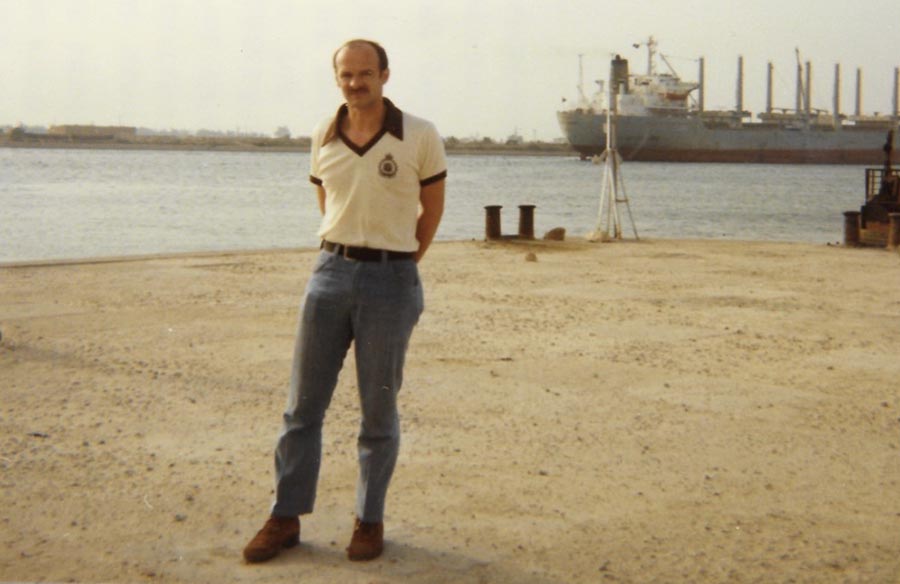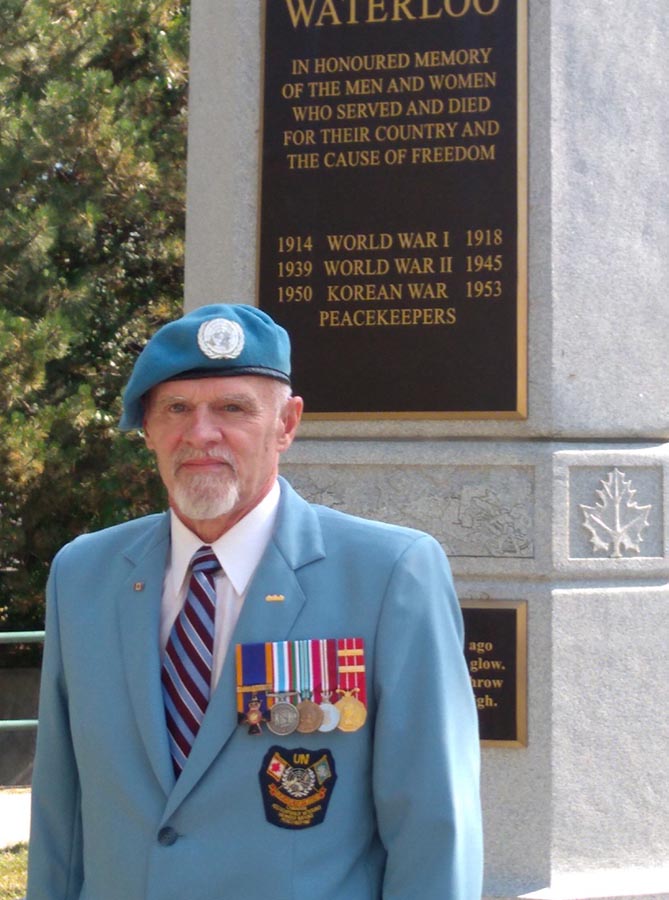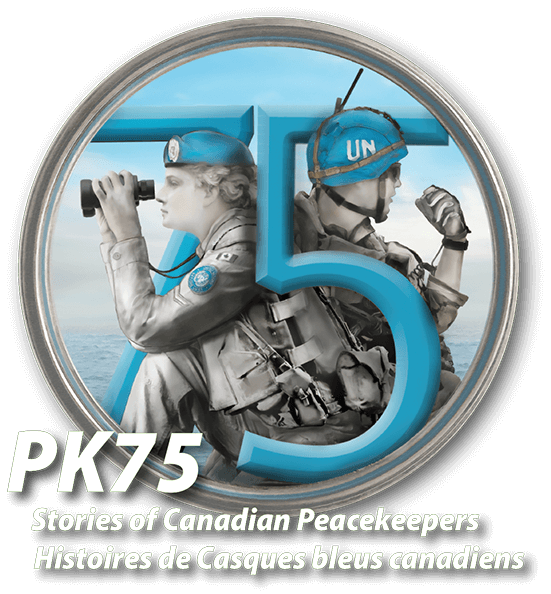

Hamilton, ON, Canada
Gordon Greavette
Current Location: Waterloo, ON, Canada
The United Nations Disengagement Observer Force (UNDOF) is one of the classic-style Pearsonian peacekeeping missions. It was created in 1973, following the Yom Kippur War, to maintain the ceasefire agreement between Israel and Syria, and is still in operation today in the Golan Heights region buffering Israel and Syria.
As a newly promoted Captain in 1978, I was seconded from my Canadian military assignment at CFB North Bay to serve a six-month, UN deployment as the Military Personnel Administration Officer for the 1200-person military force consisting of a contingent from Austria, Finland, Poland, and Canada. Consequently, I worked at the UNDOF Headquarters in Damascus, Syria. This was my first deployment outside of Canada, as well as my first operational working interaction with members of foreign military forces. Despite the complexity of my work responsibilities and the unique living experience that awaited me, no pre-deployment training was provided prior to departing Canada. Therefore, upon my arrival in Damascus, I was fortunate to have the opportunity to spend several days with my predecessor before he left to return to Canada, and he provided a crash course in working and living abroad.
As a novice to UN deployments, it proved to be a steep learning curve from both a job expectation and a personal integration aspect. In particular, the adjustment to our living arrangements in a large Arabic city like Damascus, ruled by a military dictator, Hafez Al-Assad, was a challenging adaptation experience. There was a total of seven Canadian officers serving at the UNDOF HQ, of which I was the most junior. Two Lieutenant-Colonels, who were on year-long deployments and had brought their wives with them, were housed in UN leased apartments elsewhere within the city. The remaining five of us lived on the third floor of a low-rise, four-story apartment building which had only two, three-bedroom apartments per floor. The three most senior officers lived in one of those apartments, while another Canadian captain and I shared a bedroom in the apartment across the hall. The other two bedrooms were occupied by Polish officers, two Captains who also shared a room, and a Lieutenant Colonel who had his own bedroom.
While the living conditions were relatively comfortable, it was a very new and interesting experience living in an apartment with three officers from Poland, which was then a Warsaw Pact nation. The Cold War between the West, as embodied primarily by the North Atlantic Treaty Organization (NATO) on one side and Soviet-led Warsaw Pact nations on the other, was still a major irritant to world order. From my educational experience and military training, the Warsaw Pact and its military personnel were considered to be the enemy. Fortunately, we four Captains quickly developed a reasonable friendship.
Unfortunately, the Polish Lieutenant-Colonel, while cordial, kept his distance from us. I initially believed that this was because of his rank. Interestingly, he also seemed to react more like a subordinate to one of the two Polish captains, a very outgoing individual who sported relatively long hair for a junior military officer. It did not take me long to learn that this individual was the political officer who was assigned to accompany the Polish military force. As the senior representative of the Polish Communist Party in the Polish contingent, it was his responsibility to ensure that all the Polish military personnel did not deviate from the party line.
The lease on our first two apartments expired after four months, so the UN secured a new, larger apartment that could accommodate all five Canadian officers. This new apartment, which was about half the distance to the UNDOF Headquarters building, was on the ground floor of a similar low-rise building. The amenities were similar to the first apartments, but this one had a shallow 10×12-foot outdoor pool with a nice patio and small garden area directly attached to our apartment: quite a hardship!
Interestingly, across the street and half block away was the residence housing members of a rebel faction of the Palestine Liberation Organization (PLO) opposed to the leadership of Yasser Arafat. Therefore, for me, my first and only UN peacekeeping tour was a practical, hands-on introduction to the real world of east-west relations.
Biography
Following graduation from the Royal Military College of Canada in Kingston, ON in 1977, I undertook three different sessions of classification training opportunities over the next few years. The first one was for pilot training at CFB Moose Jaw, where I was medically grounded from active aircrew status. I then proceeded to CFB North Bay in 1978 for Air Weapons controller training, which, although I successfully completed the training, did not suit my abilities. Finally, I qualified as a Personnel Administration Officer and, for my first active posting, I remained at CFB North Bay from 1980–83.
Into the second year in this position and on the same day that I brought my wife, Marguerite, home from the hospital following the birth of our first child, I received notice that I would be departing in three months for a six-month Peacekeeping tour (February–August 1983) with United Nations Disengagement Observer Force (UNDOF) in the Golan Heights. I was assigned to the mission’s headquarters in Damascus, Syria. Upon my return to Canada, I was posted as the Station Administration Officer (or the Executive Officer in Naval terminology) at CFS St. John’s, NL from 1983–86.
Upon completion of this tour and after a one-year French language course in Ottawa, I was posted to a three-year tour at Portage la Prairie, MB as the Base Administration Office from 1987–90, whereupon I was selected to attend the one-year Canadian Forces Command and Staff College course in Toronto. I then remained at the College, first as a Junior Officer Staff School instructor and then as the College’s Senior Administration Officer from 1991–1994.
I then proceeded on a four-year diplomatic assignment as the Senior Staff Officer for Administration, Training, and Visits with the Canadian Defence Liaison Staff at the Canadian Embassy in Washington, DC, from 1994–1998. After that posting, I returned to the Canadian Forces Command and Staff College, once again as the Senior Administration Officer and then, upon promotion to Lieutenant-Colonel as the Deputy Chief of Staff. Following this position, I moved to the academic side of the College working with the six-month Colonel’s National Security Studies Course as the planner for the National Security and International Relations program of study. I was also inducted into the Order of Military Merit in the rank of Officer in 2004.
Partially because of my peacekeeping activities related to the geopolitical situations, and especially because of what I was able to experience and observe because of the freedom of movement permitted throughout the Middle East region (including Syria, Jordan, Israel, and Egypt) as a member of the UNDOF Headquarters staff, I became a proponent of life-long learning. As a result, while in the Canadian Forces, I completed an Honours Bachelor of Arts in History, a Master of Arts in War Studies, and a Master of Defence Studies, all awarded through the Royal Military College, as well as a Bachelor of Education specializing in Adult Education from Brock University. While still serving at the Canadian Forces College, I also commenced my studies for a PhD through Wilfrid Laurier University.
For the next decade following retirement from the Canadian Forces in 2006, after 35-years of military service, I worked as the Chair of the School of Communications and Liberal Studies at Conestoga College in Kitchener, ON. During this period, in 2014, I completed my Doctorate, specializing in Canadian History, with two minor areas of studies: one in the History of Military and International Relations, and the other in American History.
Following my second retirement in 2015, I moved with my wife to Waterloo, ON, where we still reside. I walk, swim, and cycle regularly, and whenever weather permits during the winter months, engage in Nordic skiing. I also remain active in the community as a member of the Old Salts Seniors Canoe Club and the Waterloo Region’s Branch of the Canadian International Council. I have recently been appointed for the next four years as a member representing Waterloo Region on the Board of Directors for the Grand River Conservation Authority, and I am also the current Chair of the City of Waterloo’s Waterloo Park Advisory Committee. In the 2022 fall municipal elections in Ontario, I stood, unsuccessfully, as a candidate for Regional Council representing the City of Waterloo. Finally, my wife and I consider ourselves fortunate to have both of our children and grandchildren also living in the Waterloo Region, so that we can practice being doting grandparents.

Sinai. It is late Spring 1983, and I am standing by the ferry boat crossing which is situated about half-way along the length of the Suez Canal, on the Asian continent (in the Sinai Desert), with the African continent in the background on the other side of the Suez Canal. The canal acts as the dividing line between the two continents. The ship in the background is heading northward towards the Mediterranean Sea.

Gordon Greavette, standing by the cenotaph in Waterloo, ON, 2022.


